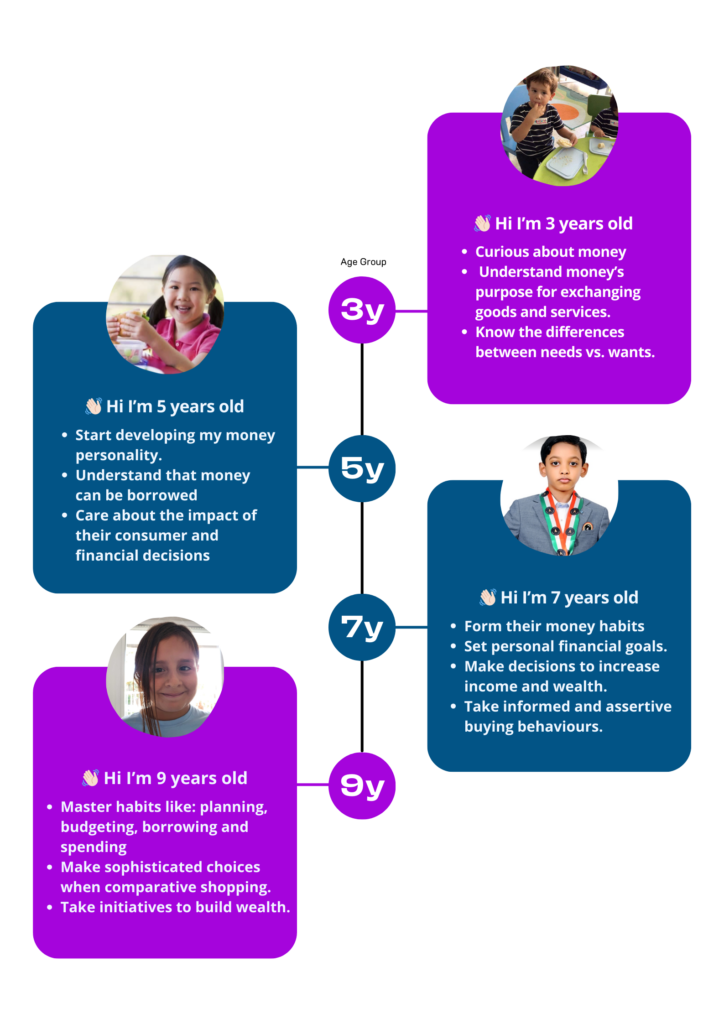Children’s attitudes and habits towards money are shaped by their parents. Responsible money management begins with early financial education. We are glad that Agata Diu, who has more than a decade’s experience in finance, particularly teaching children about money, participated in our webinar and had a conversation with Nathaly, the founder of CoinKids. For parents looking to raise financially savvy children, Agata shared valuable insights and strategies. Read this article to find out more about the webinar and learn when to start teaching kids about money by watching the videos.
Early Financial Education: Why It’s Important?
Around half of parents miss the opportunity to start teaching kids about money and finances, according to the T. Rowe Price Survey. Agata emphasizes that it is never too early to begin talking about money with children. She believes that children should be introduced to money as soon as possible, even as young as three years old.
Introducing money management fundamentals to children through simple activities such as using cash and saving in a piggy bank can help them grasp the concept of money at an early age.
Parental Influence in Teaching Good Money Habits (Ages 4-10)
When it comes to children, they follow what they see rather than what we tell them. Think about your own money habits, parents! What do you think of them? Would you like them to be improved? Don’t forget that your actions affect your children’s financial mindset!
From Piggy Banks to Budgeting: Teaching Kids About Money
Children aged four to ten can learn about saving money through tangible experiences, such as piggy banks. Children can understand the difference between setting aside money for future goals and using money for immediate desires by keeping separate piggy banks for savings and spending. Children can also be involved in budgeting activities, such as creating shopping lists and finding bargains.
Responsible money management begins with these practical lessons
1. Differentiating Needs and Wants
It is important for parents to teach their children the difference between needs and wants so that they can make responsible spending choices. This is a fundamental aspect of financial education.
Children can help their parents with shopping lists, budgeting, and bargain hunting. In addition, parents should engage their children in a discussion about their spending decisions, encouraging them to think about whether their purchases are necessary or unneeded. Children can make responsible choices with their money if their parents foster thoughtful spending habits.
2. Developing entrepreneurial spirit
How can parents encourage their children to earn money and start teaching kids about money? Identifying children’s abilities and skills is one of Agata’s suggestions. It is possible for parents to encourage their children to earn money by selling toys they no longer need, providing help to neighbors or family members, or even starting small businesses like lemonade stands. Through these experiences, children learn the value of money and develop self-confidence and entrepreneurial skills.
3. Financial Education in a Cashless Society
Digital transactions are becoming more common, which means financial education needs to adapt to the new environment. Parents can introduce their children to digital banking and safe online transactions by opening custodial bank accounts. These accounts offer a controlled environment where children can learn to manage their finances digitally. It is crucial to ensure that children understand the digital world’s risks and safeguards.
Conclusion: Making sure children are financially prepared
Financial education is a critical life skill that parents can teach their children from an early age. It is important for parents to involve their children in financial activities, set good examples, and provide age-appropriate financial lessons to equip them with the skills they will need to become financially responsible adults in the future. As the world embraces digital transactions, financial education must be adapted to ensure children are better prepared for the future.









